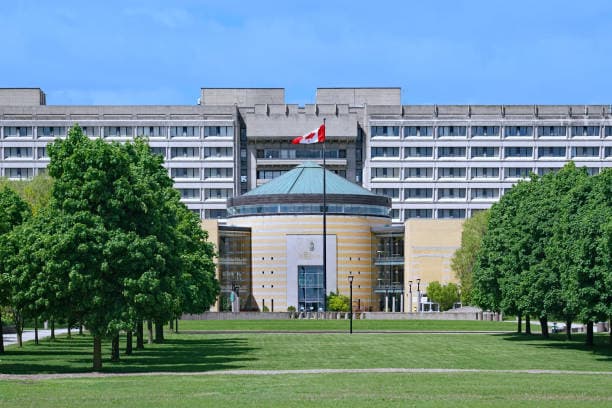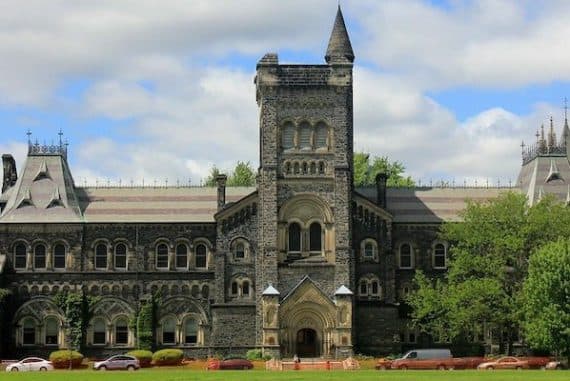Toronto is the thriving capital city of the Canadian province of Ontario. In the year 2021, it recorded a population of 2,794,356 in 2021 and therefore claims the esteemed title of the fourth-most populous city in North America. The Indigenous people inhabited the Toronto plateau adorned with meandering rivers, deep ravines and lush urban forests for 10,000 years. Toronto is a significant reflection of immigrants in Canada, where over 200 ethnic origins are known to inhabit. Embracing a culture like no other, Toronto stands as a distinguished centre for music, theatre, motion picture production, and television production. This introduction provides just a few reasons why many choose to study abroad in Toronto.
The educational sector stands as one of the major employers in the city with 1,400 educational establishments and related businesses with over 100,000 employees. The sector's total annual wages have reached $7.2 billion as of 2021. This is because more than 246, 000 students study in Toronto. They are amalgamated into numerous public universities and colleges, along with supplementary schools, seminaries and vocational institutions. Notable examples include The Royal Conservatory of Music, housing the Glenn Gould School; the Canadian Film Centre, a media training institute established by filmmaker Norman Jewison; and Tyndale University, a prominent Christian post-secondary institution and Canada's largest seminary.
Why Study In Toronto?
Toronto stands as a remarkably dynamic city, drawing students globally. Yet, what attributes make it an ideal locale for international students seeking education? Let's find out top five compelling reasons why study in Toronto is preferred by 96% of international students who recommend Canada for abroad studies.
- Student Sanctuary
Approximately half of Toronto’s population hails from outside Canada, giving rise to a multicultural environment. In Toronto, you'll experience food, art, music and events that transcend cultural boundaries. The streets and public transit are chosen by people with diverse languages, making Toronto a city that embraces diversity and takes pride in its inclusivity.
- Perfect Proximity
Toronto is nestled quite close to the United States border in south-eastern Canada. Adding to that, the city is close to various Canadian hubs like Hamilton, Ottawa and Montreal. Moreover, Toronto provides access to places such as Niagara Falls, Muskoka and Algonquin Provincial Park.
- Economic Hub
Toronto is often dubbed as the "Silicon Valley North," which houses a thriving tech ecosystem. There are nearly 300,000 tech workers here working in global giants like Google, Facebook, and Amazon. Additionally, it stands as the capital of Canada's financial services and banking industry, offering abundant opportunities for career growth.
- Safety Oasis
Toronto stands out with its low crime rate on the global stage. Ranking 6th on the Economist Intelligent Unit’s (EIU) "Safe City Index," which assesses personal safety, digital security, health security and infrastructure security. Its commitment to safety makes it an ideal destination where students can focus on their studies with peace of mind.
- Global Livability Charm
Toronto is frequently listed in the top ten "livable" cities globally, shining in the Global Liveability Index. The city earned a remarkable score of 95.4 out of 100 in 2022, securing the 8th position globally. Toronto's perfect scores of 100 in healthcare and education prove its excellence in providing world-class education and healthcare facilities.
Top Universities And Global Ranking
View all >
Toronto, Canada
Cost Of Living
CAD 24,264
CAD 9,650
#362
CAD 24,264
CAD 9,650
Canada’s fourth-largest university, York University, sometimes referred to as YorkU or YU, is a public research university situated in Toronto, Canada. The university traces its roots back to 1959 when it was established as a non-denominational institution by the York University Act. Upon receiving royal assent in the Legislative Assembly of Ontario in the same year, the university went on to welcome its first class in the fall of 1960. It is one of the most popular universities in the country with impressive overall as well as subject-wise rankings throughout.
The university is divided into eleven faculties and twenty-eight research centres providing programmes at the undergraduate, postgraduate, doctoral and professional levels across a wide variety of disciplines and areas of study.
- Faculty of Liberal Arts and Professional Studies
- Osgoode Hall Law School
- Faculty of Science
- Schulich School of Business
- Lassonde School of Engineering
- Glendon College
- Faculty of Education
- Faculty of Environmental and Urban Change
- Faculty of Health
- Faculty of Graduate Studies
- School of the Arts, Media, Performance and Design
Some of the university’s renowned research centres include:
- Centre for Atmospheric Chemistry
- Centre for Research in Earth and Space Science
- York Institute for Health Research
- Centre for Public Policy and Law
- Muscle Health Research Centre
- Institute for Research on Learning Technologies and many more.
The university’s academic affiliations include Universities Canada (AUCC), the Canadian Association of Research Libraries (CARL), the International Association of Universities (IAU), and the Council of Ontario Universities (COU). Its sporting, recreational and other miscellaneous affiliations include U Sports, Ontario University Athletics, the Canadian University Society for Intercollegiate Debate (CUSID), the Fields Institute for Research in Mathematical Sciences (FIELD), the Ontario Network of Women in Engineering, the Canadian Federation of Students (CFS), Canadian University Press (CUP) and CBIE.
The university currently houses over 56,000 students enrolled in different programmes at varying levels. The university is fairly selective in terms of its admissions policy with the York University acceptance rate being at 27%. The university opens its doors to students from hundreds of countries all over the world with a diverse student population comprising students hailing from all backgrounds, nationalities and ethnicities.

Toronto, Canada
Cost Of Living
CAD 24,264
CAD 1,846
#25
CAD 24,264
CAD 1,846
Situated in the heart of the bustling city of Toronto, the University of Toronto is a globally renowned public research university in Canada. Its history dates back 195 years when it was founded in 1827 by the royal charter as King’s College. It was the first higher education institution established in the Province of Upper Canada. The university was initially under the control of the Church of England, but in 1850 it came to be regarded by its present-day title as it became a secular institution. The university has come to be regarded as among the best in the world and number one in its home country in the field of education and research.
The University of Toronto follows a collegiate system like the University of Cambridge and the University of Oxford wherein each college has substantial autonomy in its financial and institutional affairs with great differences in their histories and characters. The institution comprises eleven colleges and sixteen faculties which govern these colleges offering over seven hundred programmes at the undergraduate level and two hundred programmes at the postgraduate level. Its different faculties are listed below.
- Faculty of Arts and Science
- Faculty of Applied Science and Engineering
- John H. Daniels Faculty of Architecture, Landscaping and Design
- Faculty of Music
- Faculty of Information
- Temerty Faculty of Medicine
- Lawrence S. Bloomberg Faculty of Nursing
- Leslie Dan Faculty of Pharmacy
- Faculty of Dentistry
- Faculty of Kinesiology and Physical Education
- Dalla Lana School of Public Health
- Faculty of Law
- Rotman School of Management
- Ontario Institute for Studies in Education
- Factor-Inwentash Faculty of Social Work
- Toronto School of Theology
The university’s academic affiliations include the Association of American Universities (AAU), the Association of Commonwealth Universities (ACU), the Association of Universities and Colleges of Canada (AUCC), the U15 Group of Canadian Research Universities and the Universities Research Association (URA). Sporting affiliations of the university include USports, the Ontario University Athletics (OUA), and the Canadian University Field Lacrosse Association (CUFLA). The research-centric university has made incredible contributions to the world of research in several fields. Its curricula in communication theory and literary criticism came to be known as the Toronto School. The university is the founding place of insulin and stem cell research and the first artificial cardiac pacemaker. It is also the place where the first successful nerve and lung transplant took place. These are just some of its groundbreaking contributions.
The university sees a massive influx of students from countries all over the world which owes to its diverse and vibrant student population. Although regarded as a competitive choice of university to get into as compared to other Canadian universities, the University of Toronto's acceptance rate is at 43% sporting a fair admissions policy.

Toronto, Canada
Cost Of Living
CAD 24,264
CAD 12,308
CAD 24,264
CAD 12,308
#77
Centennial College (also known as Centennial College of Applied Arts and Technology) is one of the popular universities located in Toronto, Ontario, Canada that awards diplomas and degrees. It is Ontario's first publicly sponsored college. With an aerospace center at Downsview Park in North York, its campuses are located on the east side of the city, particularly in Scarborough. Nearly 100 different ethnic and cultural groups are represented at the university, and there are 80 different languages spoken there. It has been regarded as a culturally diverse post-secondary institution. Centennial College’s acceptance rate stands at 67% with around 14,000+ overseas and exchange students. There are around 250+ degrees, diplomas and certificates offered to students with 100+ full-time courses and co-op programs. The five campuses that makeup Centennial are Progress, Ashtonbee, Morningside, Story Arts Center, and Eglinton. The college's primary campus is in Progress. The Progress Campus is the largest campus of the university and is home to the schools of business and hospitality, tourism, and culture, as well as a number of child studies and community service programs.
When Ontario's public college system was first established in the 1960s, Centennial was the first institution to open its doors. On May 21, 1965, Ontario Colleges of Applied Arts and Technology was founded by the Hon. William Davis, Minister of Education. Twenty-four public colleges now make up the system, which now serves 200 localities across the province. In order to accommodate new programs and students, the university saw fast growth, prompting the construction of additional campuses in Toronto's east end. The Warden Woods Campus was abandoned and destroyed in the fall of 2004 to make way for a housing development. The majority of programs were transferred to the Centennial Science and Technology Centre, which opened its doors the same year and is currently Morningside Campus.
Its primary research facilities are its aerospace innovation hub, and its Wearable, Interactive, and Mobile Technologies Access Centre in Healthcare (WIMTACH), which was founded in 2015 with the help of a $1.75 million federal grant. The Scarborough Career Planning Center, a center for adult education, was created at the university in 1992 by the Scarborough Board of Education and the college. The parties decided in 1994 to open the center there starting in the fall of that year.

Toronto, Canada
Cost Of Living
CAD 24,264
CAD 17,444
CAD 24,264
CAD 17,444
#72
Ontario College of Art & Design University, commonly known as OCAD University, is a public university of art and design located in Toronto, Ontario, Canada. The university is Canada's largest and oldest educational institution, known for art and design. It was incorporated as the Ontario College of Art in 1912, becoming Canada's first school dedicated only to the education of professional artists in fine and commercial art. The name was changed to the Ontario College of Art and Design in 1996 to reflect the expansion of design programs. To reflect the institution's status as a university given in 2002, the school was renamed to its current title in 2010.
OCAD University’s acceptance rate is between 40% to 50% with around 3,920+ undergraduate students and 260+ graduate students. The university offers programs for both undergraduate and graduate students. Students get to pick from a range of OCAD University's courses like Contemporary Art and Design, Creative Writing, Criticism, and Curatorial Practice, in addition to more than 20 art minors and 16 majors. More than 6 graduate degrees are available at the university, including Digital Futures, Strategic Foresight, and Innovation. Spoken word, indigenous visual culture, design in advertising, digital futures, graphic design, illustrations, integrated media, curatorial practice, and creative writing are among the popular courses at the university.
The university assists students in obtaining various alumni services such as career services and low-cost insurance. The alumni also host and actively participate in numerous events throughout the year. Alumni members also receive a variety of retail discounts. Some prominent alumni include JEH MacDonald (an artist who initiated the first major National Canadian Art Movement), Franklin Carmichael (a landscape artist), Doris McCarthy (an artist who paints Abstract Canadian Landscapes), and others.
Admission Process & Requirements
Admission processes and requirements for universities in Toronto generally involve an evaluation of students to ensure a competitive student body. Admissions are based on a holistic review, considering academic achievements, extracurricular activities and personal qualities. In certain cases, requirements for minors and masters in Toronto might differ. Although, these are the basic and known ones:
- Students should possess a minimum academic score of 65% or higher in Class 12th.
- A relevant bachelor's degree with an aggregate score ranging from 70% to 80% from a recognised university.
- Submission of scores from an English Language Proficiency Test such as IELTS or TOEFL.
- Required for candidates applying to master's or management courses.
Other Documents Required:
- Official academic transcripts and grade scorecards
- Letters of Recommendation (LOR)
- English Language Proficiency (ELP)
- GRE or GMAT scores
- GPA Score
- Statement of Purpose
- Passport size photos
- Photocopy of a passport
- Letter of recommendation
- Study Permit Visa
- CV/resume
Scholarships In Toronto
The country of Canada has over 93,000 awards for students with a financial aid package of $249 million. Out of which scholarships in Toronto play a big part. These are some of the scholarship schemes offered by universities here:
Lester B. Pearson International Scholarship: This is a prestigious full-ride scholarship for exceptional international students.
- Amount: Variable amount
President's Leadership Scholarship: This scholarship scheme recognises exceptional leadership qualities and community involvement.
- Amount: $5,000 award.
Ryerson International Excellence Scholarship: Supports outstanding international students pursuing postgraduate studies.
- Amount: $3,000
Toronto Film School Scholarships: These are merit-based scholarships and awards which support aspiring filmmakers at various stages of their studies.
- Amount: $2500
The Loran Scholars Foundation: Offers full-tuition scholarships and comprehensive mentorship for exceptional young Canadians.
- Amount: $100,000
FAQs
On average, Toronto universities cost CA $21,100 per year for international students.
Toronto is Canada's premier city for education, research and innovation. The city has eight publicly funded universities and colleges, along with various trades and apprenticeship institutions and research centres.
Other than the subway and bus network, Toronto has a reliable streetcar system that operates consistently. The city also features approximately a dozen streetcar lines. You can easily locate streetcar stops and routes by visiting the Toronto Transit Commission's website.
These are some of the places where students choose to live in Toronto - The Annex, Dufferin Grove and Kensington Market.
Toronto is placed sixth on the Global Peace Index 2018* and unquestionably ranks as one of the safest cities for living and studying.